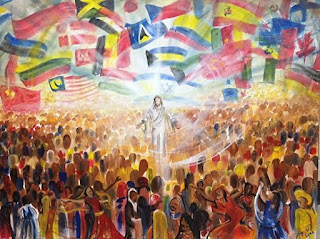Did you ever wonder why Yeshua referred to Himself as the Son of Man so many times in the gospels? Eighty one times, to be exact. It was His self-designation; nobody else referred to Him that way.
Have you ever stopped to ponder why He used that title for Himself?
To understand why, let's look at the first two-thirds of the Bible, aka the Old Testament, which of course all points to Him.
The Hebrew expression ben adam (translated to English as son of man) appears 106 times in the OT. It appears ninety-three times in the book of Ezekiel alone. God used the expression ben adam exclusively to address Ezekiel, in order to emphasize Ezekiel's humanity in contrast to God's divinity.
There are twelve additional uses of ben adam peppered throughout the scriptures which also emphasize the humanity of, well, humans. The term appears in Numbers, Job, Psalms, Isaiah, Jeremiah, and Daniel. (Only once is ben adam used in a context that could be considered Messianic, in Psalm 80:17, where it says But let your hand be on the man of your right hand, the son of man whom you have made strong for yourself).
I believe that Yeshua wanted us to know that He identified with us and was fully human. But there is more to consider. This is where it gets really interesting.
Daniel 7:13 is part of a last-days prophecy. It says this: I saw in the night visions, and behold, with the clouds of heaven there came one like a son of man, and he came to the Ancient of Days and was presented before him. (It goes on to say...) And to him was given dominion and glory and a kingdom, that all peoples, nations, and languages should serve him; his dominion is an everlasting dominion, which shall not pass away, and his kingdom one that shall not be destroyed.
This is divine language!
Daniel 7:13 was written in Aramaic. Son of man in Aramaic is bar enosh. Daniel 7:13 is the only place in the OT where that term appears.
In the gospels, the Jewish leaders were enraged when they heard Yeshua applying Daniel 7:13 to Himself . Matthew 26:63-65 says, But Jesus remained silent. And the high priest said to him, “I adjure you by the living God, tell us if you are the Christ, the Son of God.” Jesus said to him, “You have said so. But I tell you, from now on you will see the Son of Man seated at the right hand of Power and coming on the clouds of heaven.” Then the high priest tore his robes and said, “He has uttered blasphemy. What further witnesses do we need? You have now heard his blasphemy.
Guess what? We know that Yeshua spoke Aramaic (see Mark 5:41, Matthew 27:46 for examples) and He would have used the term bar enosh when quoting this passage to the high priest, leaving no doubt that He was referring to Himself as the object of Daniel's prophecy.
Every time Yeshua called Himself the son of man, His listeners heard bar enosh, which echoed the bar enosh of Daniel 7:13. Yeshua, Son of Man, masterfully blended His humanity with divine Messianic authority.
Incidentally, Daniel chapter 8 switches back to Hebrew. And in Daniel 8:17, Gabriel refers to Daniel as ben adam - a human son of man.
Coincidence? I think not. It sure seems intentional on the Almighty's part to make sure the high priest would hear Yeshua's messianic claim of being the Son of Man who is coming on the clouds, just exactly as it was written in the scriptures.
By the way, the idea of the Lord being the divine cloud rider is another awesome subject altogether, and I am going to recommend a book by Joel Richardson, The Gospel of the Skull Crusher. He has an entire chapter devoted to the idea of the Cloud Rider.


.jpg)













